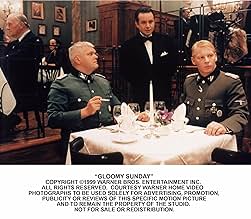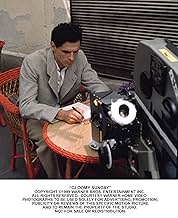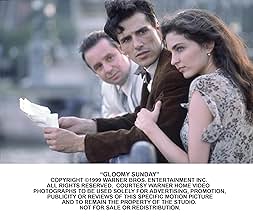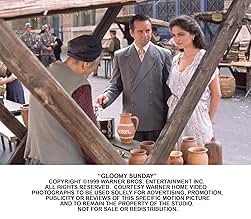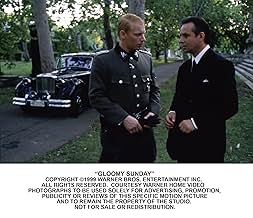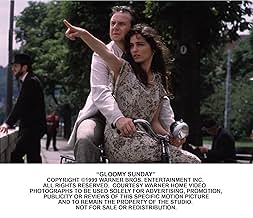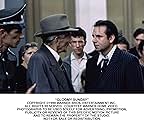PUNTUACIÓN EN IMDb
7,8/10
8,7 mil
TU PUNTUACIÓN
Añade un argumento en tu idiomaFollows three men who are in love with a beautiful waitress during World War II: an intellectual restaurant owner, a mysterious musician, and an erratic businessman.Follows three men who are in love with a beautiful waitress during World War II: an intellectual restaurant owner, a mysterious musician, and an erratic businessman.Follows three men who are in love with a beautiful waitress during World War II: an intellectual restaurant owner, a mysterious musician, and an erratic businessman.
- Dirección
- Guión
- Reparto principal
- Premios
- 7 premios y 5 nominaciones en total
Reseñas destacadas
"Gloomy Sunday (Ein Lied von Liebe und Tod)" is a very mittel-European take on "Jules et Jim."
It has resonance with "The Pianist," but was produced in 1999 and is only being released in the U.S. now. Based on an urban legend grounded in fact it demonstrates how a piece of music can perfectly capture the zeitgeist of its times, so much so that it influences people's lives to end them. The original facts, with a list of recordings, are documented at www.phespirit.info/gloomysunday/ which is how I knew to find Marianne Faithfull's recording in my collection to play as I write this.
A love quadrangle starts off as an open, free-spirited affair between a jovial restaurant owner and his high-spirited, sensual hostess, becomes a complex three-some with a sultry composer, then an uptight tourist gets tangled in their lives. But this is Budapest 1933 - 1945, and the personal becomes the political, as the restauranteur is Jewish, the tourist transforms into an S.S. officer, and the composer's signature melody haunts them and the airwaves throughout a Europe falling like dominoes.
While there are lovely shots of the bridges and narrow streets of Budapest in a warm, lush cinematography, especially as seen on desperate bicycle rides (in dress and high heels no less), much of the movie takes place in the restaurant, so that the passage of time and the resulting changing stresses are marvelously shown by the actors' body language. Some of the coincidences are a bit thick, but the political commentary up to the present is effectively pointed.
The melody only gains in power throughout the film and is much more timeless in capturing the feelings of the time -- and any parallel experiences--than the pop or patriotic music Americans associate with the period. From the untranslated credits, it seemed that the closing version in English is Artie Shaw's, though the lead singer wasn't identified there. In the film, the lyrics are an after-thought to try and capture the music's meaning.
It has resonance with "The Pianist," but was produced in 1999 and is only being released in the U.S. now. Based on an urban legend grounded in fact it demonstrates how a piece of music can perfectly capture the zeitgeist of its times, so much so that it influences people's lives to end them. The original facts, with a list of recordings, are documented at www.phespirit.info/gloomysunday/ which is how I knew to find Marianne Faithfull's recording in my collection to play as I write this.
A love quadrangle starts off as an open, free-spirited affair between a jovial restaurant owner and his high-spirited, sensual hostess, becomes a complex three-some with a sultry composer, then an uptight tourist gets tangled in their lives. But this is Budapest 1933 - 1945, and the personal becomes the political, as the restauranteur is Jewish, the tourist transforms into an S.S. officer, and the composer's signature melody haunts them and the airwaves throughout a Europe falling like dominoes.
While there are lovely shots of the bridges and narrow streets of Budapest in a warm, lush cinematography, especially as seen on desperate bicycle rides (in dress and high heels no less), much of the movie takes place in the restaurant, so that the passage of time and the resulting changing stresses are marvelously shown by the actors' body language. Some of the coincidences are a bit thick, but the political commentary up to the present is effectively pointed.
The melody only gains in power throughout the film and is much more timeless in capturing the feelings of the time -- and any parallel experiences--than the pop or patriotic music Americans associate with the period. From the untranslated credits, it seemed that the closing version in English is Artie Shaw's, though the lead singer wasn't identified there. In the film, the lyrics are an after-thought to try and capture the music's meaning.
The charm of this film consist in the way to tell old things, in the description art of a well - known world.
"Gloomy Sunday" is a kind of Frankenstein's creature: pieces of "Lili Marleen", "Casablanca" or "The story of 1900", slices of Hungarian's atmosphere, Nazi ghost and menage en trois.
For all that, it is a good movie, his virtue is, in fact, just absence of originality. Like many other movies, the spell is result of a mysterious flavor who persist in your memory months, years and in special moment it saves the image of a sweet trip.
Undoubtedly, it is the story of a song, in same measure that the song is the only character. But, at second sight, it is a warm homage to Mitteleuropa, the gorgeous Kakania's spirit. The lost of youth and the last recollection's skin. The shadow of Goethe's "The Sorrows of Young Werther" is powerful and insidious.
A subtle wishfulness anatomy. And a song like his backbone.
"Gloomy Sunday" is a kind of Frankenstein's creature: pieces of "Lili Marleen", "Casablanca" or "The story of 1900", slices of Hungarian's atmosphere, Nazi ghost and menage en trois.
For all that, it is a good movie, his virtue is, in fact, just absence of originality. Like many other movies, the spell is result of a mysterious flavor who persist in your memory months, years and in special moment it saves the image of a sweet trip.
Undoubtedly, it is the story of a song, in same measure that the song is the only character. But, at second sight, it is a warm homage to Mitteleuropa, the gorgeous Kakania's spirit. The lost of youth and the last recollection's skin. The shadow of Goethe's "The Sorrows of Young Werther" is powerful and insidious.
A subtle wishfulness anatomy. And a song like his backbone.
This film is about the life of a woman, who got caught between 2 lovers against a backdrop of the turbulent times of the Holocaust.
Words cannot describe how beautiful and powerful this film is. Everything is excellent. The sets are beautiful, and the scenes are beautifully composed. Ilona is great as the lady which every men would fall in love with. She has this graceful elegance which is very magnetic. Laszlo's work as the restaurant owner is convincing, he has every detail of the restaurant under control. The music is great. When I listened to the song "Gloomy Sunday', I felt this chill spreading through my body, as if I was going to be the next victim. Another highlight for me is the uptight secretary who lives by the book, which is clearly a satire about the German culture. The plot is highly touching and powerful, and I do urge everyone to see this beautiful film.
Words cannot describe how beautiful and powerful this film is. Everything is excellent. The sets are beautiful, and the scenes are beautifully composed. Ilona is great as the lady which every men would fall in love with. She has this graceful elegance which is very magnetic. Laszlo's work as the restaurant owner is convincing, he has every detail of the restaurant under control. The music is great. When I listened to the song "Gloomy Sunday', I felt this chill spreading through my body, as if I was going to be the next victim. Another highlight for me is the uptight secretary who lives by the book, which is clearly a satire about the German culture. The plot is highly touching and powerful, and I do urge everyone to see this beautiful film.
...on why this film is doing well in communities unafraid to see subtitled films. For one thing, the beginning and ending create and resolve a compelling mystery (most of the film is a flashback). For another, you may or may not believe that a song could drive people to suicide, but you must admit it is a beautiful, sad and haunting melody. The story held my interest, as did the characters. The other obvious appeal was the opportunity to gaze endlessly at the incredibly lovely and angelic Erika Marozsán. I am female and straight and I could not get enough of looking at her; I could easily believe that she might inspire a piece of music that conveyed its composer's hopeless longing for her. (And he wasn't so hard to look at himself!) The only thing I couldn't figure out about Mr. Simpson's comments was what the film had to do with New Zealand. Now I know: nothing! :-)
According to the Los Angeles Times review of this film, "The song was actually composed in 1935 by Rezsö Seress, with lyrics by László Jávor, and did in fact accompany a number of suicides as Europe grew darker; Billie Holliday recorded a popular American version." So I guess it's not so far-fetched after all! Who knew?
According to the Los Angeles Times review of this film, "The song was actually composed in 1935 by Rezsö Seress, with lyrics by László Jávor, and did in fact accompany a number of suicides as Europe grew darker; Billie Holliday recorded a popular American version." So I guess it's not so far-fetched after all! Who knew?
"Gloomy Sunday" was a movie I happen to see by chance. Apparently my city is the only city in North America that is showing this movie. It is playing in one theatre in a small suburb. My father and I went to see this movie he wanted to see it because we are Hungarian and wanted to hear what kind of music would be played. To my surprise I found that I had actually enjoyed the movie. My expectations were low, only because I didn't have a clue as to what to expect but, I'm very happy I saw this film. It's one of the best films I've seen so far this year. The movie is about a few things. One of it's main story-lines concerns a love triangle concerning Laszlo (Joachim Krol), Ilona (Erika Marazan) and Andras (Stefano Dionisi). Laszlo owns a restaurant and Ilona is his girlfriend. Laszlo is hoping to have some music in his restaurant and hires a piano player, Andras. Andras likes Ilona. And Ilona it seems likes Andras. So he movie it seems will be a love story set during the beginning of WW2. But, there's also another story building. Andras has written a song called "Gloomy Sunday". He has written for Ilona. But soon the song becomes a hit. It's a beautiful song that seems to have a very strange effect on whoever listens to it. Soon afterwards people are committing suicide. And here we have a case of fact stranger than fiction. For it is this part of the story that is actually true. "Gloomy Sunday" is based on this story with the love theme used as a backdrop. I don't know if or when this movie will be wider release in North America. But I hope people will go see this movie. In fact though I doubt that people from this country have even heard of this movie. Here is a movie that NEEDS to be better known. It is a small gem. *** out of **** or a 7\10.
¿Sabías que...?
- CuriosidadesWieck, the Nazi played by Ben Becker, is a fictionalized SS Col. Kurt Becher, who was acquitted in Nuremberg of war crimes and who ended up the richest man in Germany.
- PifiasAt a movie theater, the trio watches a newsreel that declares that the song "Gloomy Sunday" "drove 157 people in Hungary to suicide in the past eight weeks." It's unknown whether that statement ever actually appeared in a German newsreel during the war. There is no evidence that the song ever actually drove more than a handful of people--if any--to suicide.
- ConexionesFeatured in Die Männer vom K3: Jugendliebe (1999)
- Banda sonoraSzomorú Vasárnap/Gloomy Sunday
Music by Rezsö Seress
Lyrics by László Jávor
English lyrics by Sam Lewis (as Sam M. Lewis)
Akla Musikverlag Berlin
Selecciones populares
Inicia sesión para calificar y añadir a tu lista para recibir recomendaciones personalizadas
- How long is Gloomy Sunday?Con tecnología de Alexa
Detalles
- Fecha de lanzamiento
- Países de origen
- Idiomas
- Títulos en diferentes países
- The Piano Player
- Localizaciones del rodaje
- Empresas productoras
- Ver más compañías en los créditos en IMDbPro
Taquilla
- Recaudación en Estados Unidos y Canadá
- 585.604 US$
- Fin de semana de estreno en EE. UU. y Canadá
- 7102 US$
- 22 jun 2003
- Recaudación en todo el mundo
- 646.532 US$
- Duración
- 1h 52min(112 min)
- Color
- Mezcla de sonido
- Relación de aspecto
- 1.85 : 1
Contribuir a esta página
Sugerir un cambio o añadir el contenido que falta


